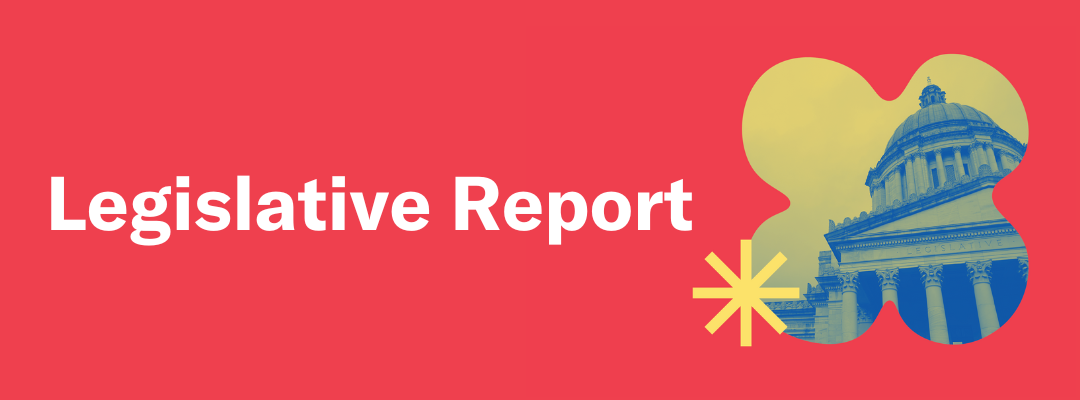Published:
Friday, March 29, 2024
40 years ago, driven by misinformation and junk science, Washington state abolished parole. In the decades after, our state continued to pass laws that harmed our young people — particularly young people of color. These laws perpetuated cycles of trauma, violence and incarceration. We locked people up and threw away the key.
The result? Washington state has not just been an active participant in the proliferation of mass incarceration, we have been a leader. We have one of the highest rates of people serving life sentences in the nation — twice the national average.
As of December 2023, over 50% of people in Washington prisons were serving a sentence of ten years or more — a 9% increase since 2019.1 There are currently more Black people serving de facto life sentences for crimes they committed as young adults than there are white people in the same situation, despite making up only 4% of the state’s population.
Last year, when the legislature passed HB 1324, it recognized that the use of prior juvenile adjudications to lengthen adult sentences results in unjust sentences and is not necessary for the preservation of public safety. However, by making the bill only apply prospectively and not retroactively, the bill’s impact was substantially minimized. This year, when the legislature decided not to retroactively end the practice of punishing people twice for crimes they committed as children, it left behind approximately 1,400 people, the majority of whom are people of color, serving sentences that would not be given today.
On March 7, the Washington state Legislature wrapped up the 2023-24 legislative biennium. Not a single piece of retroactive sentencing reform legislation made it to the governor’s desk and into law — leaving decades of racist “tough on crime” policy in our state untouched. In a state that does not have parole, that is unconscionable.
Regarding the process of change, Angela Davis once remarked, “You have to act as if it were possible to radically transform the world. And you have to do it all the time.” Acting with the conviction that it is possible to radically transform this world can feel difficult during times like these. We face deeply entrenched systems erected to deny the humanity of those who are justice-impacted, to promote profit over people, and to protect the status quo.
Yet, when I reflect on the 2023-2024 legislative biennium, I think about how the movement for criminal legal reform in Washington has radically transformed how we approach advocacy work, and how that plays a critical role in the continued movement to transform our world.
I think about how the emerging adult parole bill and the retroactive juvenile points bill were both designed by incarcerated people. I think about the incredible incarcerated activists we’ve worked with over these last two years, who risked retaliation to testify in front of the legislature and lead coalitions from prison cells.
I think about the support the movement has received from survivors of violence who recognize that their healing is not dependent on perpetual punishment.
I think about the 21 Tribes and Indigenous organizations that supported the retroactive juvenile points bill in recognition that Indigenous people are most disproportionately harmed by the practice of punishing people twice for crimes they committed as children. Without the support of the Tribes, the juvenile points bill would have never made it as far as it did.
These are the bright spots. I am hopeful because of the community that has formed to uplift and forefront the voices and experiences of those most impacted by mass incarceration. This is a transformative way to approach change and it’s how we can continue to know and act as if it is possible to radically transform the world all of the time.
The result? Washington state has not just been an active participant in the proliferation of mass incarceration, we have been a leader. We have one of the highest rates of people serving life sentences in the nation — twice the national average.
As of December 2023, over 50% of people in Washington prisons were serving a sentence of ten years or more — a 9% increase since 2019.1 There are currently more Black people serving de facto life sentences for crimes they committed as young adults than there are white people in the same situation, despite making up only 4% of the state’s population.
Last year, when the legislature passed HB 1324, it recognized that the use of prior juvenile adjudications to lengthen adult sentences results in unjust sentences and is not necessary for the preservation of public safety. However, by making the bill only apply prospectively and not retroactively, the bill’s impact was substantially minimized. This year, when the legislature decided not to retroactively end the practice of punishing people twice for crimes they committed as children, it left behind approximately 1,400 people, the majority of whom are people of color, serving sentences that would not be given today.
On March 7, the Washington state Legislature wrapped up the 2023-24 legislative biennium. Not a single piece of retroactive sentencing reform legislation made it to the governor’s desk and into law — leaving decades of racist “tough on crime” policy in our state untouched. In a state that does not have parole, that is unconscionable.
Regarding the process of change, Angela Davis once remarked, “You have to act as if it were possible to radically transform the world. And you have to do it all the time.” Acting with the conviction that it is possible to radically transform this world can feel difficult during times like these. We face deeply entrenched systems erected to deny the humanity of those who are justice-impacted, to promote profit over people, and to protect the status quo.
Yet, when I reflect on the 2023-2024 legislative biennium, I think about how the movement for criminal legal reform in Washington has radically transformed how we approach advocacy work, and how that plays a critical role in the continued movement to transform our world.
I think about how the emerging adult parole bill and the retroactive juvenile points bill were both designed by incarcerated people. I think about the incredible incarcerated activists we’ve worked with over these last two years, who risked retaliation to testify in front of the legislature and lead coalitions from prison cells.
I think about the support the movement has received from survivors of violence who recognize that their healing is not dependent on perpetual punishment.
I think about the 21 Tribes and Indigenous organizations that supported the retroactive juvenile points bill in recognition that Indigenous people are most disproportionately harmed by the practice of punishing people twice for crimes they committed as children. Without the support of the Tribes, the juvenile points bill would have never made it as far as it did.
These are the bright spots. I am hopeful because of the community that has formed to uplift and forefront the voices and experiences of those most impacted by mass incarceration. This is a transformative way to approach change and it’s how we can continue to know and act as if it is possible to radically transform the world all of the time.





